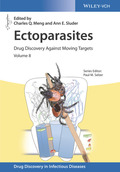Ectoparasites
Drug Discovery Against Moving Targets
Drug Discovery in Infectious Diseases

1. Edition July 2018
376 Pages, Hardcover
12 Pictures (6 Colored Figures)
Handbook/Reference Book
Short Description
With its unique coverage of parasite biology, current drugs, the latest drug discovery tools, molecular targets and novel therapeutics, this ready reference is ideal for those working in veterinary and medical ectoparasitology, whether newcomers or veterans.
This first book specifically dedicated to ectoparasite drug discovery is unique in providing insights from the veterinary as well as the medical perspective, covering research from both industry and academia while paving the way for new synergies between the two research communities.
Edited by a team combining 80 years of experience in academic research and industrial antiparasitic drug discovery, this volume of Drug Discovery in Infectious Diseases summarizes current knowledge in this rapidly expanding field. Comprehensive yet concise, this ready reference blends solid background information on ectoparasite biology with the very latest methods in ectoparasite drug discovery. Three major parts cover current ectoparasite control strategies and the threat of drug resistance, screening and drug evaluation, and the new isoxazoline class of ectoparasiticides. The future potential of mechanism-based approaches for repellents and parasiticides is thoroughly discussed, as are strategies for vaccines against ectoparasites, making the book ideal for parasitologists in academia as well as researchers working in the pharmaceutical industry.
Comparison of Anti-Ectoparasite and Anti-Endoparasite Therapies and Control Strategies
Vaccination Against Ticks
Blocking Transmission in Vector-borne Diseases
The Threat and Reality of Drug Resistance in Cattle Tick Rhipicephalus (Boophilus) microplus
Monitoring Drug Sensitivity in Cattle Ticks
New Developments in the Control of Human Lice
PART TWO: Screens & Models
Molecular Targets to Impair Blood Meal Processing in Ticks
Whole-organism Screens for Ectoparasites
In vitro Feeding Methods for Hematophagus Arthropods and Their Application in Drug Discovery
Testing in Laboratory Animal Models for Ectoparasiticide Discovery and Development
Testing in Target Hosts for Ectoparasiticide Discovery and Development
PART THREE: Isoxazolines
Isoxazolines: A Novel Chemotype Highly Effective on Ectoparasites
The Discovery of Afoxolaner: A New Ectoparasiticide for Dogs
Development of Afoxolaner as a New Ectoparasiticide for Dogs
Discovery, Development, and Commercialization of Sarolaner (Simparica®), A Novel Oral Isoxazoline Ectoparasiticide for Dogs
Isoxazolines: Preeminent Ectoparasiticides of the Early Twenty-first Century
Dr. Ann E. Sluder earned a PhD in Biochemistry from Duke University in 1988 studying transcription biochemistry in Drosophila melanogaster. During postdoctoral studies at Harvard Medical School and Massachusetts General Hospital she initiated a research program focused on nuclear receptor transcription factors in the nematode Caenorhabditis elegans, which she expanded to include parasitic nematodes while an Assistant Professor of Cellular Biology at the University of Georgia. From 2000-2014 Dr. Sluder worked in drug discovery for antiparasitics, orphan neuromuscular diseases and viral and fungal infections at two biotechnology companies. In 2015 she joined the Vaccine and Immunotherapy Center of the Massachusetts General Hospital, managing preclinical development programs in infectious diseases, cancer, and diabetes.
Prof. Dr. Paul M. Selzer studied Biology, Parasitology, and Biochemistry at the University of Tübingen, Germany, where he also received his PhD in Biochemistry. He spent three years at the Molecular Design Institute and the Tropical Disease Research Laboratory at the University of California, San Francisco. During his career he has worked as a researcher and scientific manager for several pharmaceutical companies, and is currently holding a management position in antiparasitic drug discovery at Boehringer Ingelheim Animal Health. He is also a visiting professor at the Interfaculty Institute of Biochemistry of the University of Tübingen, DE and an honorary professor of the Department of Infection, Immunity, and Inflammation at the University of Glasgow, UK.


